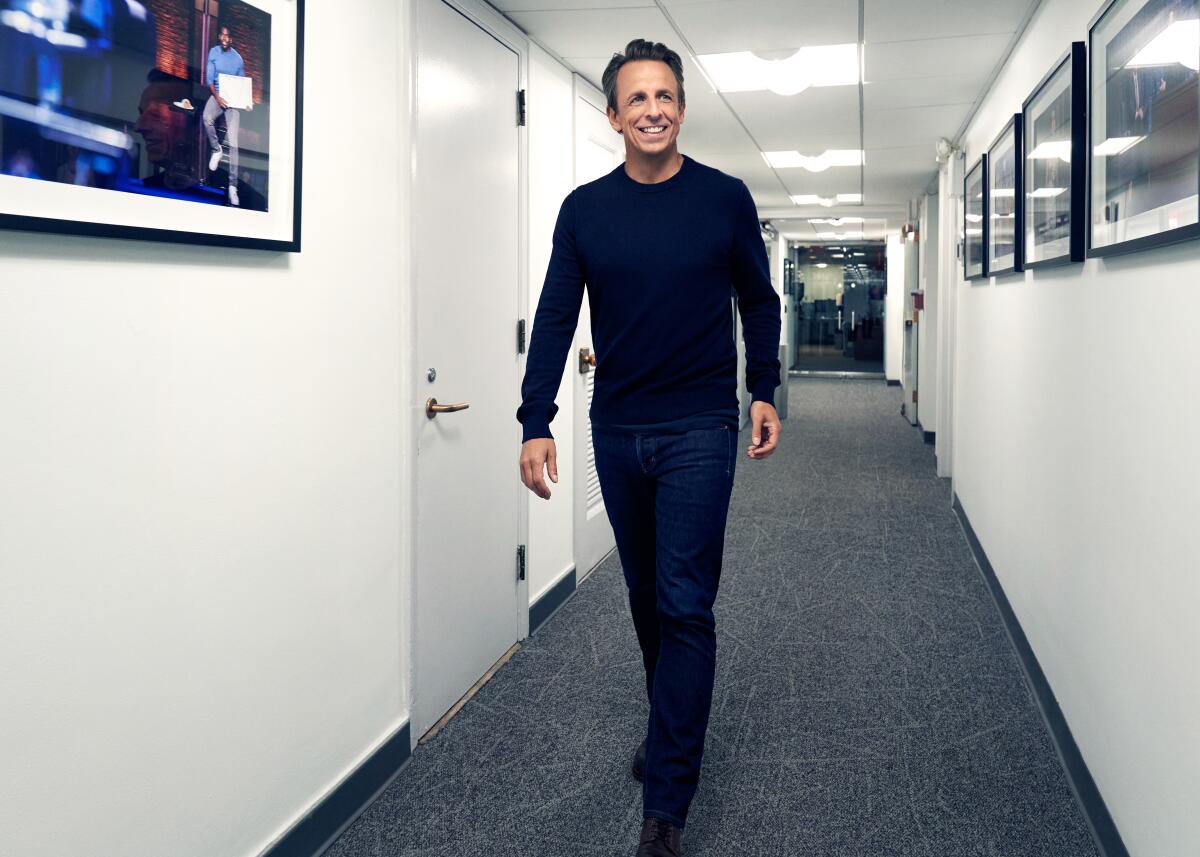NEW YORK — It’s Thursday night, and Seth Meyers has reached the end of his official workweek: I’ve watched him tape “Late Night,” which he’s hosted since 2014, and I’ve seen him do his weekly web-only add-on, “Corrections,” an Emmy-nominated bonus segment in which he addresses all the nitpicky comments viewers leave on his YouTube videos. Now he’s settled in for an interview with The Envelope in a greenroom at 30 Rock with an icy-cold drink. Miller time? Nope: “It’s a Negroni,” he notes. “From a can.” Cheers!
There aren’t a lot of silver linings to the pandemic quarantine, but by doing “Late Night” from your attic for a few months, you learned how to work without an audience. How did that help with developing “Corrections,” which you do in front of an essentially empty studio?
We did fall in love with doing the show without an audience. “Corrections” was the way to hold on to a piece and say, “Hey, we also love that thing that some of you at home loved, and so we’re still going to do this because it’s special 20 minutes a week to remember the closeness we had.” Because part of “Corrections” is, if no one is actually in the room with me here, we’re all in the same room.
Comedians always talk about feeding off the energy in the room, but the lack of energy seems quite comfortable for you. Before the main show taping even started tonight, you told the audience not to applaud particular jokes because you don’t know what to do with yourself when that happens.
Weirdly, I loved not having that moment of having each individual joke judged audibly. Something like “A Closer Look” is very densely written. The last thing we want to do is have to hit the brakes, even though it’s lovely. I love it when people laugh, so I want a reaction. But I also like not having to slow down.
“Corrections” also reminds me of when David Letterman was first doing “Late Night” — that on-the-fly, no-budget, unvarnished feel. To me, late-night shows really changed once executives decided they were moneymakers and started paying attention to ratings.
Doing something like “Corrections” is a chance for us to say, “Hey, we’re not going to disturb what the NBC ‘Late Night’ franchise has become.” But we did love the lo-fi, handmade feel of those [Letterman] shows and the freedom of knowing no one is paying attention.
Has “Corrections” made you a freer, looser host for “Late Night”?
Yeah. That looseness was more thrust upon us from the pandemic, but it was something I realized I liked and I’m trying to hold onto. “Corrections” is this way to end each week by embracing looseness. It’s a great palate cleanser, especially because we’re talking about the end of this f— nightmare week [which included the school shooting in Uvalde, Texas]. The kind of week where you wish you had any job in the world other than the one where you had to address what happened this week.
You, along with several other late-night hosts, pivoted hard into politics after the 2016 election, and you’ve stayed there. Any regrets on making that shift?
No. I enjoy what we do now a lot more than what we did in the beginning. In the beginning, I felt like I was doing an impression of what the “Late Night” show should be. Whereas now I feel like I’m myself.
Why keep things political, after Trump was voted out?
There are certain bad-faith actors who say, “Why are you obsessed with him? Why do you keep talking about him?” If I thought there was a new face of the Republican Party, I would shift gears. But I don’t think there is. They have two years to prove me wrong.
In HBO’s new documentary “George Carlin’s American Dream,” Jerry Seinfeld notes that nothing any comedian has ever said has changed his mind. Do you hope to change minds with what you do on “Late Night”?
If there’s any minor change, it would be to convince people to vote instead of not voting. I do not think that I am necessarily changing minds. This is a place to come for people to feel cathartic. I don’t think we’re trying to change minds, nor do I think that there would be any way to change certain minds.
I’d always nursed this naive idea that well-done entertainment could allow audiences to see the world in different lights or empathize with people they don’t know. If not, what’s the point of getting into controversy the way you do?
Well, it entertains, that’s one thing. If people can watch and laugh, they can feel better about life. I don’t think that laughter just passes through us without having an effect. Because especially after the horrific events of this week, you realize sometimes the best thing you can do is drill down on yourself and your family and find joy there. I’m not egotistical enough to think we’re making a difference. But I’m not going to act like we can’t.






